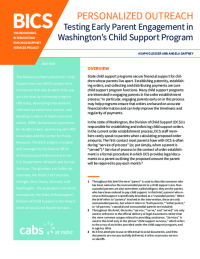Personalized Outreach
Testing Early Parent Engagement in Washington’s Child Support Program

In the state of Washington, the Division of Child Support (DCS) is responsible for establishing and enforcing child support orders. In the current order establishment process, DCS staff members rarely speak to parents when calculating proposed order amounts. The first contact most parents have with DCS is often during “service of process” (or, put simply, when a parent is “served”). Service of process in the context of order establishment is a formal procedure in which DCS provides legal documents to a parent outlining the proposed amount the parent will be required to pay each month.
According to an analysis of DCS data, payments on newly established orders are low. In addition, 75 percent of the orders included in that analysis were established by default, meaning the parents did not actively engage in the child support process before their proposed order amounts went into effect.
The Behavioral Interventions for Child Support Services (BICS) team heard from DCS staff members a belief that parents’ distrust of the child support agency may make them less willing to comply with their orders. For the BICS intervention, therefore, DCS aimed to foster a more cooperative relationship with parents during the order establishment process, in order to increase collections in the short term and ultimately to obtain more regular payments in the longer term. The intervention included several components: a specialized unit of caseworkers, pre-service outreach phone calls, a follow-up letter to parents who could not be reached by phone, and a new cover sheet for the service package.
To test the intervention, DCS randomly assigned more than 1,800 parents with new child support cases in Washington to one of two groups: intervention or control. Control group parents received business-as-usual conditions, while those in the intervention group received the new process.
There was limited evidence that the intervention increased parent engagement in the order establishment process. In addition, the intervention did not improve payment outcomes in the first six months following random assignment as DCS and the BICS team hypothesized it would. There are several potential explanations for the lack of impacts on payment outcomes. For one thing, there was no specific call to action related to making payments included in this intervention. For another, DCS made contact with a relatively low percentage of parents in the intervention group (54 percent), which may have reduced the effects of the intervention. It may also be that nonpayment is due to issues that are not behavioral in nature, such as a parent’s inability to pay or poor relationship with the custodial parent.
On a positive note, the intervention did not have any negative impacts on service efficiency. Before the intervention, many staff members expressed concerns that calling parents in advance of service could lead them to evade service and would delay the order establishment process. However, study results show that the pre-service outreach efforts did not make it more difficult to serve parents within 90 days.
Though there is limited evidence of measurable impacts on key outcomes, the caseworkers involved in the intervention and state agency leaders liked this new approach. Agency leaders felt that the experience showed it is possible to train staff members to implement an approach informed by behavioral science. The specialized BICS caseworkers who volunteered to deliver the intervention saw it as an opportunity to take a more active, customer-focused approach to case management and found that parents they called were generally receptive to their efforts.






